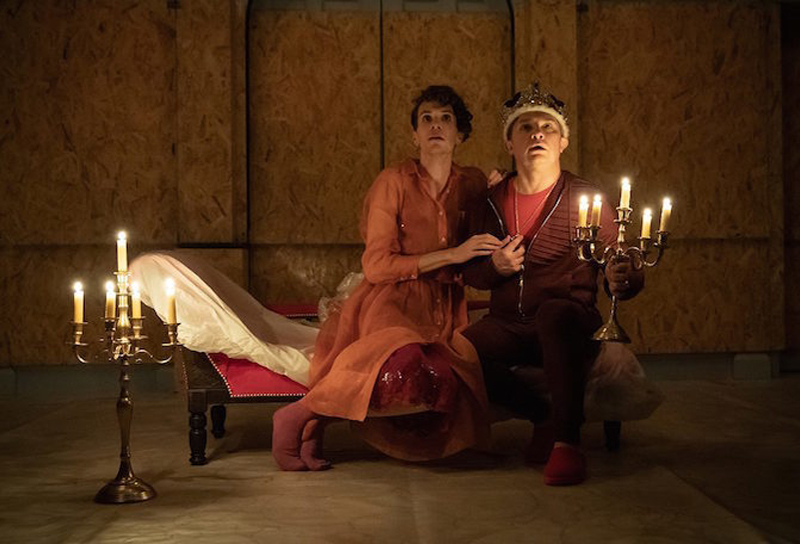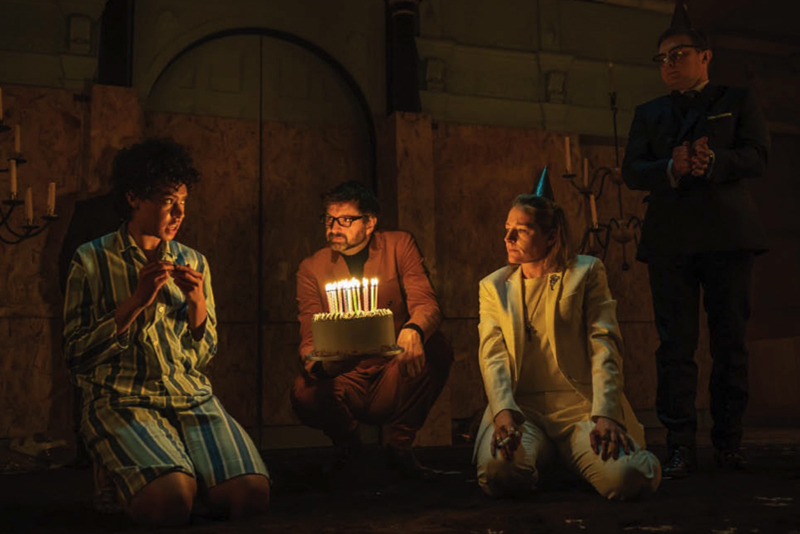“Henry VI” and “Richard III”, Shakespeare’s Globe
Julie Sorokurs on London’s South Bank
22 November 2019
Shakespeare’s history play cycles conclude their run at Shakespeare’s Globe this winter with a pairing of Henry VI and Richard III. Having started with an all-women-of-colour production of Richard II at the indoor Sam Wanamaker Playhouse last spring, then moving outdoors to the Globe Theatre in the summer for Henry IV Parts I and II and Henry V, the project returns to the Sam Wanamaker for the bloody climax of the Wars of the Roses. Although the multi-roling ensemble is substantially the same (with gender-fluid casting as before), the final shows have two new people at the helm.
Directors Sean Holmes and Ilinca Radulian had their work cut out for them when taking on the task of adapting the three plays comprising Henry VI into a single “epic” (to use their words) production, one worthy of preceding the markedly more popular, and arguably more interesting, Richard III. And as it happens, l enjoyed Henry VI better than l did Richard III. l nevertheless find myself remembering very little of what l liked about the former and a great deal more of what l found frustrating about the latter. The reputation of either play demonstrably figured into my experience of seeing them, as l was only pleasantly surprised by Henry but sorely disappointed by Richard.
Grace Smart’s definitive touch as set designer on both productions propelled us into the present moment: we had Henry VI in a hoodie and trainers, the Duke of Clarence in Birkenstocks, and Richard III in white-framed sunglasses. Plastic bags replaced swords and sheets of tarpaulin were secured to the walls and floor in anticipation of the bloodshed to come. The effect was not so much a modern re-imagining as it was a smoothing-over, a consolidation of plot and atmosphere into a present-day aesthetic.

Stefan Donnelly as Queen Margaret in Henry VI. Photo credit: Marc Brenner.
Though there was blood and dirt aplenty, l appreciated this creative paring-down of the costumes and decor, particularly as it opened up numerous avenues for comic relief that were gleefully traversed by all involved. The plot was simplified significantly, for example, by characters wearing their family crests and allegiances on their T-shirts and kneepads (as if at a sporting event).
What l liked best was the theme of brutish patriotism as it was established and maintained throughout the two productions. We were treated to distinctly “English” scenes of war and social unrest; football chants of “England!” spontaneously started up at the mere mention of the country’s name; entire cans of beer were emptied over the many victims on the York family’s hit-list; masked hooligans prowled the peripheries of the theatre space, intimidating audience members with bats and chainsaws. Not only was all of it very refreshing, it was also neat and matter-of-fact in the way it went about closing the gap between today’s Britain and the fifteenth century.
l wonder, however, the extent to which Richard’s “make-over” was justified. With no hump or physical deformities to speak of, Sophie Russell’s Richard is only crooked in his methods and twisted in his pleasures. The trouble is that no one seems to be more aware of this than Richard himself; it felt as if at any point he might roll his eyes at the audience and wonder aloud: “What am l like?” Russell’s performance is a strange cross between Phoebe Waller-Bridge’s tragi-comic character in the television series Fleabag (all long limbs and cheeky asides; she wins her audience over with well-timed innuendos laced with double-meaning) and Tilda Swinton’s 3,000-year-old vampire in Jim Jarmusch’s 2014 film Only Lovers Left (a balancing act between regal and feral, dressed head-to-toe in white, wasted and wanton).
Though Richard is meant to address an audience, and is indeed amongst the more self-aware and introspective villains in the works of Shakespeare, Russell’s performance leaves a great deal to be desired. Admittedly, her physical presence is mesmerizing; she is sleek, lithe, and feline as Richard, particularly when repeatedly seducing, bedding, and disposing of victims (including, to the audience’s great amusement, Lord Buckingham). When Richard breaks out the maracas (and even a full-blown Elvis get-up) to sing Kris Kristofferson’s “For the Good Times” every time an enemy is slaughtered, one can’t help but take pleasure in how much Russell is enjoying herself.
But she prowls the stage as an “edgy” stand-up comedian might (acknowledging our laughter and taking distinct beats to encourage more of it), and too often she flies through her lines as if to achieve the cadence of one. lt all too nearly comes across as “gimmicky”; Richard is all style and no substance — a cartoonish representation of what evil might look and act like when no one’s looking. I mostly lament the stifling of Shakespeare’s language, and the complexity it could have afforded this Richard, as so much of it is lost to this (initially entertaining) interpretation.

Stefan Donnelly and Jonathan Broadbent in Henry VI. Photo credit: Marc Brenner.
Sarah Amankwah as Eleanor in Henry VI, and as Edward IV in Richard III, provides some idea of how the productions could have been a more memorable success. Even in scenes coloured by Smart’s present-day touches (like a hospital gown and a drip-stand on wheels for a sickly Edward IV), it is nevertheless Amankwah’s skill as a performer that infuses Shakespeare’s ever-relevant verse with the vitality of any moment. The same is true of Jonathan Broadbent’s Henry VI and Lord Buckingham, and indeed of John Lightbody’s Humphrey of Lancaster and Duke of Clarence. Broadbent’s, particularly, are performances of enthralling understatement. l would go so far as to argue that his Henry provided the production with both a purpose and focus that went beyond providing an “origin story” for Richard III.
What Amankwah, Broadbent, and Lightbody all have in common is a self-possession that is as rare as it is indispensable for bringing Shakespearean drama into the present-day. Where it seemed as if Russell’s Richard needed to have regular costume changes and to break into musical numbers in order to remain interesting to the audience, the above-mentioned performers simply commanded our attention.
lt also bears mentioning the space of the Sam Wanamaker Playhouse itself. Entirely candle-lit and small as it is, its intimacy lends itself to Henry VI’s isolated and ever-dwindling court as well as it does to the stifling and paranoid court of Richard III. With the added “Weimar-esque” aesthetic of exaggerated shadows and half-obscured faces, Queen Margaret’s ire (a dynamic and sustained performance by Steffan Donnelly) is fantastically sinister every time the candelabra she brandishes comes close enough to illuminate her distraught features. Even the smell of recently extinguished candles contributes to the haunting atmosphere of the space, as it implies the snuffed-out lives of some of the characters, gone from the stage but with an absence that lingers.

Nina Bowers, John Lightbody and Sophie Russell in Richard III. Photo credit: Marc Brenner.
Ellie Wilson’s contributions as composer were effective in putting a sound (a saw and violin) to the ever-tightening spring of tension sustaining both plays. Wilson’s compositions and arrangements, performed live on a wooden balcony overlooking the stage, served to remind the audience of looming war (beating drums and all) and even seemed to instil the performers themselves with a steady thrum of anxiety. As the two productions suffered at times from appearing to be hurried as well as endlessly flat, the music never failed to reignite my investment in the goings-on on stage.
Most interestingly, Henry VI and Richard Ill begin and end with the seventeenth-century English folk ballad “The Dominion of the Sword” (initially entitled “Law lies a bleeding”— a parodic take on the song “Love lies a bleeding”) which starts with the following lines:
“Lay by your pleading, law lies a-bleeding, Burn all your studies now, and throw away your reading; Small power the word has, and doth afford us, Not half so many privileges, as the sword does.”
The song recognizes the futility of truth, reason, and learning, when at the mercy of the holder of power, or “the Sword.” Need l ask whether that sounds familiar? It is particularly emblematic of how, as ever, the works of Shakespeare remain a relevant and necessary lens through which to observe Britain’s and indeed the world’s) present-day troubles. Though Henry VI and Richard III ultimately fell short of their ambitions, l applaud the ambitions that they had.
Julie Sorokurs









